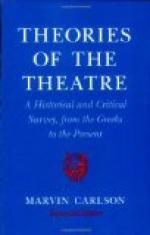A logical development of this principle leads us to the axiom that a dramatist must never keep a secret from his audience, although this is one of the favorite devices of the novelist. Let us suppose for a moment that the spectators were not let into the secret of Hero’s pretty plot, in Much Ado, to bring Beatrice and Benedick together. Suppose that, like the heroine and the hero, they were led to believe that each was truly in love with the other. The inevitable revelation of this error would produce a shock of surprise that would utterly scatter their attention; and while they were busy making over their former conception of the situation, they would have no eyes nor ears for what was going on upon the stage. In a novel, the true character of a hypocrite is often hidden until the book is nearly through: then, when the revelation comes, the reader has plenty of time to think back and see how deftly he has been deceived. But in a play, a rogue must be known to be a rogue at his first entrance. The other characters in the play may be kept in the dark until the last act, but the audience must know the secret all the time. In fact, any situation which shows a character suffering from a lack of such knowledge as the audience holds secure always produces a telling effect upon the stage. The spectators are aware of Iago’s villainy and know of Desdemona’s innocence. The play would not be nearly so strong if, like Othello, they were kept ignorant of the truth.
In order to economise attention, the dramatist must centre his interest in a few vividly drawn characters and give these a marked preponderance over the other parts. Many plays have failed because of over-elaborateness of detail. Ben Jonson’s comedy of Every Man in His Humour would at present be impossible upon the stage, for the simple reason that all the characters are so carefully drawn that the audience would not know in whom to be most interested. The play is all background and no foreground. The dramatist fails to say, “Of all these sixteen characters, you must listen most attentively to some special two or three”; and, in consequence, the piece would require a constant effort of attention that no modern audience would be willing to bestow. Whatever may be said about the disadvantages of the so-called “star system” in the theatre, the fact remains that the greatest plays of the world—Oedipus King, Hamlet, As You Like It, Tartufe, Cyrano de Bergerac—have almost always been what are called “star plays.” The “star system” has an obvious advantage from the point of view of the dramatist. When Hamlet enters, the spectators know that they must look at him; and their attention never wavers to the minor characters upon the stage. The play is thus an easy one to follow: attention is economised and no effect is lost.




